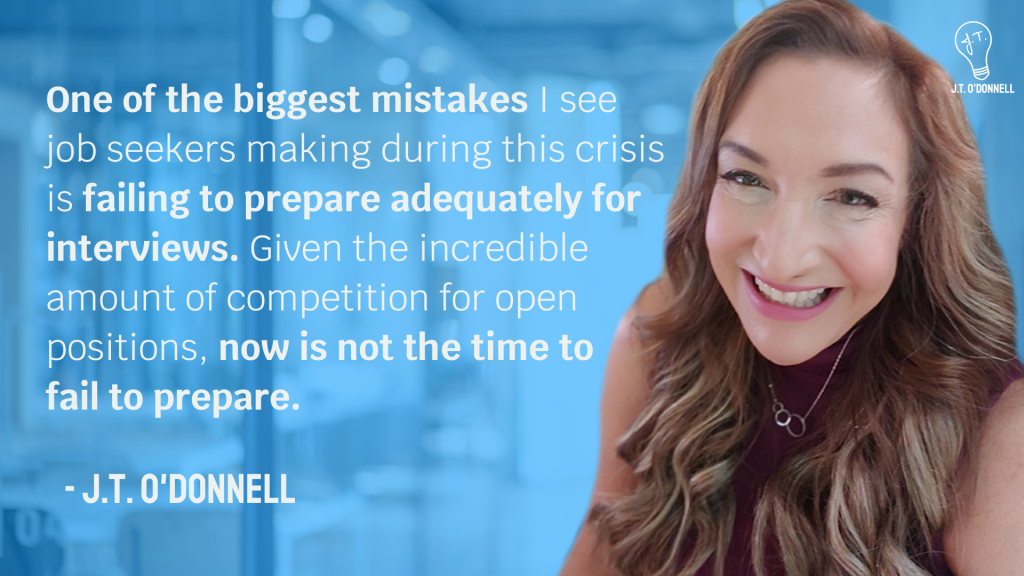One of the biggest mistakes I see job seekers making during this crisis is failing to prepare adequately for interviews. Given the incredible amount of competition for open positions, now is not the time to fail to prepare.
If you want to be taken seriously and stand out in this competitive job market, you need to put a significant amount of focus on your interview preparation. Here is what you need to know…
1. Interview prep starts BEFORE you apply. The moment you start applying, you should be ready for the unexpected call from a recruiter saying, “can we talk right now?” Saying no will cost you the interview because they have 100 more people after you they can contact.
Many job seekers make the mistake of waiting until an interview is scheduled to start preparing, and fail to take into account that a recruiter could call at any moment. Beyond the unexpected call from a recruiter, it’s just smart to start preparing for the interview as soon as you begin the job search process. There’s some common interview questions that are universal, and you can always tailor your responses based on the job you’re applying to.
2. Each type of interview is different. It’s important to know your audience! Recruiters screen you for basic fit. Hiring managers screen you to see if you’ll make their life easier or harder. HR wants to make sure you are a cultural fit. CEOs want to make sure you are worth the money. Knowing how to address each person in the interview process you meet with is part of making sure you get chosen as the right person.
3. Thank you doesn’t mean “sell yourself.” Sending a thank you note after every interview is a must-do. You should also try to send one to each person in the hiring process. That said, these are short notes meant to show you have good manners. It is not the time to try to sell them or recap your strengths. This comes across pushy, or even worse, desperate.
4. Behavioral questions are meant to get inside your head. A series of open-ended questions are often asked as a way to understand how you think. Employers use behavioral questions to assess your personality and depth of knowledge.
It’s important to research some of the most common behavioral interview questions, and practice by writing down your responses. I recommend that you use the Experience + Learn = Grow model when crafting your responses. This includes outlining a professional experience related to the question, talking about what you learned from the experience, and how you grew from it professionally.
Failing to practice will make your answers sound scattered or weak.
5. Asking good questions is as important as answering them. Employers want to know you’ve done your homework. They also want to see you are assessing them as much as they are assessing you. Asking the right questions will show your intelligence and expertises. Asking the wrong ones will reveal your weaknesses.
6. “No” doesn’t mean “never.” If you don’t get the job, don’t give up on the relationship. Ask what you can do to stay in touch for future opportunities. Especially if you are a finalist. You never know when another role will pop up. And in some cases, the person they hired doesn’t work out, giving you the chance to swoop in and save the day.
How you perform during the job interview process will play a major role in your professional future. The process should be taken extremely seriously and treated with the respect that it deserves.
You want to get paid thousands of dollars to do a job. Put in the effort to stand out. You get out what you put in! Now is not the time to “wing it.”
P.S. Here’s An Opportunity To Jumpstart Your Interview Preparation
As I stated earlier, the competition for open positions is extremely competitive. You need every advantage that you can get. My company, Work It Daily, has made it a priority to do all we can to help job seekers through this pandemic. We are doing this by hosting online Job Search Summits.
Work It Daily’s next online Job Search Summit is scheduled for Tuesday, Sept. 22 from 10 a.m. to 4:30 p.m. (ET). This all-day summit will cover everything you need to know about the online job search, and give you a good sense of the resources available on the Work It Daily platform.
For just a 1-time $10 fee, you’ll receive access to:
– Exclusive trainings on perfecting your resume, cover letter, and LinkedIn profile
– Discover the trick to successful networking (even during a pandemic)
– How to properly prepare for ANY job interview
Work It Daily also offers these great FREE resources:


